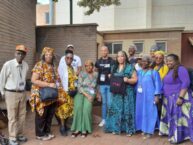 Wise was born in Bamenda, North West Cameroon, where part of growing up involved reading most of the novels in his father’s small library. His short story entitled ‘Devils’ won third prize at the 2014 Writivism International Short Story Contest held in Kampala, Uganda, where he also took part in the Writers’ Studio Workshop. He holds a Bachelors in Accountancy from the Oxford Brookes University UK and a Masters in International Development from the Institute of Education, University of London. Wise is the Founder and Executive Director of Action Foundation, a leading youth-development civil society organization in Cameroon. He is an award winning activist and social entrepreneur.
Wise was born in Bamenda, North West Cameroon, where part of growing up involved reading most of the novels in his father’s small library. His short story entitled ‘Devils’ won third prize at the 2014 Writivism International Short Story Contest held in Kampala, Uganda, where he also took part in the Writers’ Studio Workshop. He holds a Bachelors in Accountancy from the Oxford Brookes University UK and a Masters in International Development from the Institute of Education, University of London. Wise is the Founder and Executive Director of Action Foundation, a leading youth-development civil society organization in Cameroon. He is an award winning activist and social entrepreneur.
‘‘My President is a genius!’’ Elizabeth exclaims and laughs as I walk in, without looking up from the newspaper. ‘‘He deserves a Nobel Prize,’’ she concludes, suddenly wearing a serious look. The contrast between the initial laugh and the now thoughtful frown irritates me, even more than her words. A boy dressed in nothing but a pair of shorts sits by her side. He has a broad chest covered in shiny black hair, a solid six-pack and well-toned arms. I do not greet. I just stand there with my hands in my pockets, glaring down at him. He gets up and leaves. I have little patience with kids who sleep around with their grandmothers and even less respect for grandmothers like Elizabeth who sexually enslave their grandsons. I should call her Mum with love, with the reverence that every child should have for the woman that brought them into the world, but I call her Elizabeth.
When the boy vanishes into the house, I take the seat on the other side of the table, from where I can see Elizabeth’s face. Elizabeth still does not look up. She is whispering to the newspaper. She smiles, she slaps the paper as if to congratulate it for bearing good news. You would think that I am some invisible thing or a sight too unpleasant to behold. But no. This is Elizabeth: the thespian, the politician and player who knows how to put on a good show, even for an audience like myself that she wants to ignore.
‘‘My President is a genius!’’ she cries again and kisses the newspaper. I clench my teeth.
Another half-naked boy strolls in with a bottle of Ergon Muller. Without asking, he opens and pours two glasses. Elizabeth reaches for her glass. One long swig and it’s all but dry.
‘‘Ah, Monsieur le President. Tu es fort,’’ she says, holding up the glass in front of her eyes. You would think she is praising the wine maker.
I sit there, trying to catch her eye. But she does not look at me. I wait for her to say something about the day’s cover story in the Daily Standard, but she does not. She is drinking, whistling to herself and talking to the newspaper about the president.
We are sitting at the balcony of one of her many mansions, watching the people go up and down the streets on this hot Saturday afternoon. Coming in from outside, I know it is hot. But if you sit up here, where a sweet breeze flows freely from air conditioners and kisses you softly in the face like Elizabeth, you would not know.
From the balcony you can enjoy an excellent view of the neighbourhood that sprawls beyond Elizabeth’s high stone wall, barb wires and gold-coated gates. Fifteen people can live comfortably in this palace. But she shares it with her nineteen- year- old gold-digger, the young man who left a while ago when I walked in. Four house helps – mostly unsuspecting teenage boys – two drivers and three security guards take care of them. On show at the right wing of the marbled yard is a fleet of the latest design of BMWs, Prados, Chryslers, and Infinities. In the far left end is a heart-shaped pool of clean blue water.
A little girl lumbers barefooted up the street as if she is counting her steps. She is carrying a container of water on her head, a container so large that you wonder how her rope-like feet carry her under that weight. Women are returning from the market with bags of green vegetables and plantains tied behind rough-riding bendskins. They speed past, minute by minute. In my neighbourhood, like many others, when these bikes race up the streets, they leave behind a thick cloud of dust. Not here. The tarmac leading to Elizabeth’s palace is thick, smooth, sparkling. Just like all the others leading to the vulgar monstrosities that those who run this country call their homes.
Elizabeth is fidgeting with the newspaper. From far inside, the unmistakable voice of that peckish praise-singer of the ruling party who mistakes himself for a journalist, reaches us. Listening to state radio is like sitting on a chair of needles.
‘‘Wow! Did you see this?’’ Elizabeth holds out the paper. ‘‘My president did it again. Why did nobody tell me about this? Wow!’’ she cries. I do not move.
Elizabeth reaches for my glass of wine and empties it in another quick guzzle. I bend over and refill the two glasses and place them in front of her. She is a gigantic woman both physically and otherwise. Moving herself around is a lot of work as you would imagine. As a minister in the president’s cabinet, she deserves to be served with a lot of veneration, in exactly the same manner that she and the rest of the cabinet worship the president, the god of the rich-few. After all, it is no mean feat to become a minister in this country: you join the ruling party; you study very hard and get yourself a PhD; you publish papers, become a professor; you send motions of support to the president every month; you must bow to him and his wife if you are ever honoured to meet them; you must panic and show that you are very afraid of this god; do not look him straight in the eyes; never express the ambition of becoming a president yourself. And this one is very important: in everything you say, start with in the name of his Excellency the President or like Elizabeth you can simply say my president.
The boy who served the wine has now returned with two trays of two whole chickens, fresh from the grill, with every morsel intact, except for the intestines. It is no secret that Elizabeth loves her chicken whole. So when a visitor comes around, two or more whole chickens must be roasted.
Elizabeth eats. She whistles and devours. Bones snap like tiny twigs between her teeth. I do not join her. In a few minutes, all that is left of her chicken are a few hard bones and a kidney. I think the kidney is bitter.
Elizabeth shouts for the wine boy, a tall, black, lanky fellow with two harsh tribal marks on each cheek.
‘‘Clear up and take that one to my dogs,’’ she says waving at what is supposed to be my chicken. ‘‘My dogs deserve good chicken Ousmanou, don’t you think so?’’
‘‘They do Ma.’’ Ousmaou grins and bows, baring all the teeth in his mouth.
I hear a noise from outside the gate and look over the wall. Two boys and a girl are returning from the stream. One of the boys is walking ahead of his friends. He has balanced his bucket of water on his head and is walking along without supporting it with his hands, as if to show off how strong he is. The next minute, a scream goes up into the air; the boy struggles to find his feet, but it is too late. He goes crashing. The bucket hits the ground and breaks up into a few pieces. His friends laugh and jeer. ‘‘Strong man,’’ they taunt as he lies there in a puddle of his own mess. Elizabeth has since picked up the newspaper. She does not look up. She does not flinch.
‘‘I do not understand why anyone would be against my president,’’ Elizabeth says when the commotion from outside her gate dies down. This time she looks up and gives me the newspaper.
As I take the paper, I look at her face closely. Elizabeth does not look good. Only last month I had told myself that her face did not have room for any more wrinkles. And now as I look across, it seems she has added another hundred already. The skin in her face is visibly thin, dry and fragile. The fat that once filled those spaces in her cheeks and chin have all but disappeared, so that those areas have sagged considerably. It seems there is an ongoing battle between skin, muscles, and bones and the skin is suffering terribly in the crossfire.
I jiggle with the paper as if I do not know what I am looking for. When Elizabeth empties her glass and looks up at me, I hold it out so that she can see the caption of the cover story. I take a deep breath.
‘‘Elizabeth, what is this?’’ I ask.
‘‘Don’t be stupid. What is what?’’ she lashes out.
‘‘Did you ask Rebecca to write this?’’
‘‘What is Rebecca?’’ She empties another glass.
The doctors have since banned her from drinking alcohol, but who is a doctor to ban Her Excellency from doing as she pleases?
‘‘I have a question of my own for you young man. Why do you visit me only when you appear in the papers?’’
‘‘I can’t come here all the time to watch kids massaging your thighs. That boy was not born when I completed school. Did you ask Rebecca to write this?’’
She laughs out loud, long and hard. It is the laughter of five drunk mothers on Women’s Day put together. Elizabeth’s voice is rough, noisy, upsetting. And when she laughs out loud like that, it echoes in your ears for a very long time.
‘‘Mr Jason Nji, PhD,’ she mocks. ‘‘Award-winning Activist, Award-winning Grownup. You walk into my house, sit on soft sofas, cross your legs, open your rotting mouth, call me Elizabeth and insult me? Oh God!’’ She spits out and grabs her glass and puts it back on the table without drinking. ‘‘These breasts,’’ she grabs them. ‘‘You suckled from these breasts. These thighs,’’ she slaps her thighs with both hands and points to her pubic area, ‘‘you came out through here. You are lucky I have not yet thrown you out of my house. Activist my foot!’’ She grabs her glass.
***
Only a few hours ago I was at my place, cleaning up my room when the phone rang.
‘‘Is it true?’’ a voice asked from the other end, trembling. I listened. I played the question over and over again in my head, trying to discern the voice. It was husky, nice and husky, unlike the coarse, ugly huskiness of Elizabeth’s voice. The caller was breathing hard into the earpiece, like she had raced to the top of a mountain just to ask me that one question. After a minute of trying, I gave up.
‘‘And you must be…?’’
‘‘Dump the pretence!’’ she barked.
The sudden display of aggression by the unknown caller caught me off-guard. I stood back and gaped at the phone in my hand. I was going to put it back to my ear when I heard her shout, ‘‘You are all the same, anyway. Idiot! ’’ Then she hung up.
I shook my head at the receiver and placed it back.
I found Kumalo’s number and dialled. If you are looking for somebody who reads all the stories in the papers, then Kumalo is your man. If you are also looking for somebody who spends half of his lifespan exchanging salutations, then Kumalo is still your man. He exchanges greetings more than a Fulani Cattle Man. He would ask if you slept well and if your wife slept well. He would ask after the kids and neighbours. He would ask if your dogs fed well and if the crops on your farm are flourishing. Then he would pray that thieves do not attack you at night; that your car does not breakdown in the middle of the road…
‘‘Anything for me in the papers today?’’ I asked before he could greet.
‘‘Read the Daily Standard, cover story…’’ I dropped. If I gave Kumalo the chance he would have given me a long list of people to whom I should extend his warm, sincere salutations.
I sent for the Daily Standard, the same one Elizabeth has been fidgeting with. The caption of the day’s cover story said it all: Finally, finally: Jason Nji joins the ruling party!
I stared at the paper for a whole minute. But I did not read. I did not want to read. I did not know what I wanted to do. I should have screamed, but I just sat there gawking.
Then my eyes fell on the reporter’s name: Rebecca Njoma. At last I knew what I wanted to do. I wanted to tear that paper, I wanted to trash it and force it down Rebecca’s throat.
I called Kumalo.
And when he picked, I realized that Rebecca was not the one I really wanted to see.
Elizabeth, I thought.
***
Two years ago, I stopped reading the papers when some sucker of a reporter wrote that I had sent a motion of support to the President. Kumalo investigated. Reliable sources said Elizabeth had bribed Rebecca to scribble that garbage.
I confronted Elizabeth.
Elizabeth said she is a busy woman with little time for gabble.
I insisted. I wanted to know the truth.
Elizabeth looked me over like dirt and asked me to get lost. She asked security to show me out of her office.
I believed and still do believe that this woman here did it. But she looked me in the eye…that day, she looked me in the eye without blinking and asked a man of muscles-and-no-brain to show me the way out.
It broke my heart, not because she asked me to get lost. It broke my heart because I could make do with even a secretary – anybody with a head, anybody with whom I could exchange scholarship, however primary – not a brainless overzealous plebe with a gun.
Today, my smiling face is on the cover of the Daily Standard. Elizabeth has done it again.
***
Elizabeth is now on her second bottle of wine. I have almost given up on getting her to talk about the cover story. Maybe I should just go now before I spit out the anger that is raging in my head. But I can’t. It would be wrong to go without telling her my mind. I sit back and just keep staring at her.
Her Excellency Professor Elizabeth Ndaba (PhD), alias Big Sugar Mummy, is a big woman in many ways. Born in 1950, she has since grown to a height of 175 cm. She weighs 120 kilos. She has divorced three husbands. When she got tired of getting married, she began to devour young boys, mostly poor innocent virgins or so I hear. She is one-time Minister of Education, one-time Minister of Public Health, and one-time Minister of the Public Works. She is Minister of Telecommunications and Board Chair of three state corporations. Her bank accounts are scattered all over the world in francs, dollars, pounds, euros, yens and shillings. Each time Forbes publishes that list of the World’s richest women, she always laughs at their naivety.
Growing up was sweet. I was an only child from a father whom I do not know. Elizabeth gave me all I wanted: shoes, money, clothes, money, plane tickets, girls and a lot of money. I loved Elizabeth. I really did. She built a world for me in which there was no suffering. She protected me from all the ugliness of life – of her life and that of the citizens of this country for whom she works so hard to make miserable. I can go on and on about how she pampered me but I do not want to. The wealth blinded me. I was only a happy fool, with little knowledge of the reality of life outside the filthy, opulent world that Elizabeth had created for me.
‘‘My son,’’ Elizabeth says now. I am sceptical about her change of mood, but I am hoping that she would finally say something about the cover story.
‘‘Yes Elizabeth,’’ I answer and sit up. I do not know what I will do if she confirms my suspicion.
‘‘Why do you hate my president so much?’ she purrs. ‘‘My president is a peacemaker. What do you want from him?’’ You should hear the concern in her voice.
‘‘Nothing Elizabeth. Nothing,’’ I snap. ‘‘I am too young to expect anything from your president.’’
Elizabeth always wins. She always ends up getting me to talk about the things she wants us to talk about.
‘‘How many positions have you occupied in his government?’’ I ask, although I know they are too many for her to remember. She does not answer as expected.
‘‘You are blind. That man has been a disaster for this country.’’ I say it with vim, as if it is the declaration of independence.
‘‘Oh stop this rubbish!’’ she screams. ‘‘What do you know?’’ She sighs a long unending sigh and bends over to collect her glass. I go for it and give it to her. I wait for her to talk.
‘‘My love…’’ she starts to purr again.
‘‘Please,’’ I cut her off.
‘‘You need some good wine,’’ she says and bursts out laughing like an animated water bag. ‘‘You are learning fast, my boy.’’ She continues laughing until tears begin to stream down her face. ‘‘Ah, my stomach aches,’’ she laughs some more, holding her stomach.
‘‘Ok, let’s talk about this,’’ I do not think there is much to laugh about now. ‘‘Elizabeth, Chief Bosang – the Senator- he passed away yesterday,’’ I whisper. You will think that I am announcing the most important thing in the world, but she knows about the death of her friend already.
‘‘The Chief fought for this country till his last breadth. May his soul rest in peace.’’ Elizabeth decides not to see where I am going to.
‘‘How old are you Elizabeth?’’ I demand, looking into her eyes. I expect her to be angry with this line of questioning. And she is, there is no pretence now. Only the depth of her anger is much more profound than I anticipated. Her jaws drop. I see her hands trembling. I can tell she is deeply offended. She wants to talk, but she is such a devoted actress that she attempts a laugh instead. Her efforts end up in ruins. She tries again. This time she hits the notes perfectly. The laughter is highly-spirited and fake.
‘‘You have little to offer this country. But what do I know? What do kids know?’’ Before I know it, I am standing right in front of her, talking down to her, pointing a finger at her.
‘‘Kids,’’ Elizabeth says and shakes her head.
I must control myself.
‘‘Elizabeth, all you do is steal. One billion today, two billion tomorrow. One hungry boy today, another gold-digger tomorrow.’’ I think I am shouting now, for the gold-digger comes running to the balcony. One look at my face, and he runs back inside.
‘‘Look at yourself.’’ I have lost it. ‘‘You ought to be in prison for every dime you wrongfully displaced; for every child that missed school because you stole the teachers, the furniture and their books.’’ I feel a deep sense of relief in my stomach with each word I speak. Yet a different kind of hurtful emptiness refills it instantly.
‘‘For patients that died because you stole the doctors and medicines. For every soul lost on four-metre wide highways because the other six metres are in your bank account in Caiman Islands!’’
I am so engrossed that I do not realize that Elizabeth has slummed. She lies there breathing hard, her chest rising and falling heavily. A tiny stream of saliva is sliding down the sides of her mouth.
‘‘Elizabeth.’’
She does not answer.
I shake her gently. I think she is acting.
‘‘Elizabeth!’’ I shout. She does not move. I fall down on my knees and touch her below the neck, but I can barely feel her pulse.
I begin to give her mouth to mouth, but it is of no use. The heavy breathing has stopped.
I run out shouting for the security guards, who come running towards the balcony.
***
It was my eighteenth birthday and Elizabeth had invited every conman who has a say in the running of this country to come and celebrate with us. They were secretaries of state, directors of ministries, CEOs of big corporations, central committee members of the ruling party and judges of the Supreme Court. My mates from college were there too, noisier than ever. The food and drink could have been worth a decent primary school.
Elizabeth was in her infectious good mood. She was dressed in a red suit, mini skirt, high heels and loads of make-up, made to match with the gold rings, chains and bracelets that adorned her fingers, neck, and wrists. She was everywhere thanking her guests, pouring wine for my friends, shouting at Samu and the security guys to come and join the party.
Elizabeth is making a speech; Elizabeth is flirting with a man at the back of the hall, an elderly fellow who looks pristine and charming in an immaculate white agbada. She hugs new arrivals, comes to me and kisses me and says happy birthday darling like I’m her lover.
The birthday song had been sung, the cake had been cut and eaten, the gifts had been received and the wine was flowing endlessly. And we were dancing Njang, Makossa, Bikutsi…One moment Elizabeth is working up the crowd with crazy Makossa moves, the next she is surrounded by a band of my school mates clapping and shouting as she breakdances to Thriller.
It was meant to be a happy day and I was thrilled. We had had quite a bit to eat and drink and some of the guests had started to depart. I wanted to make a speech. I wanted to thank the guests for coming. I wanted to thank Elizabeth for the new BMW, for the man that I was at eighteen. For everything. And I was looking for Elizabeth everywhere, but Elizabeth was nowhere to be found.
I made my way through the crowd in the hall and hallways but she was not there. I called her phone and it kept ringing but she did not pick up. And when she did not show up after a minute I decided to check on her in the toilet.
But it was in the bedroom that I found Elizabeth. Maybe I should have waited for her to ask me to come in after I knocked. But I did not. I never did. I went in and there they were. Elizabeth on top and Mike under. He was kissing her breasts; she was riding him. He was digging into her from below; she was moaning.
That was it. That was all I saw: my mother and a boy of my age having sex in her room while we celebrated my birthday outside. I started asking questions. And answers I found. Only the answers were too disgusting for my innocent existence to accept. And that was how a revolution was born in my head.
***
Elizabeth is sitting up at her chair again when I return with the security guards, just as if nothing has happened. She is reading the cover story and sipping from a glass of wine. I excuse the guards and stand there looking down at her, noticing her breathing normally, seeing her smiling and talking to the newspaper. I stand there not knowing what to do. I stand there wanting to ask if she needs some water, wanting to ask if she is fine. I stand there playing with my fingers like a kid, not wanting to be there and yet not wanting to go away. Elizabeth does not look up at me. Not even when I say goodbye. I leave her at the balcony. I go down the stairs and through the gold-coated gate, knowing that it is going to be a long time before I ever see her again.
***






2 comments for “My Good Old Woman by Wise Nzikie Ngasa”